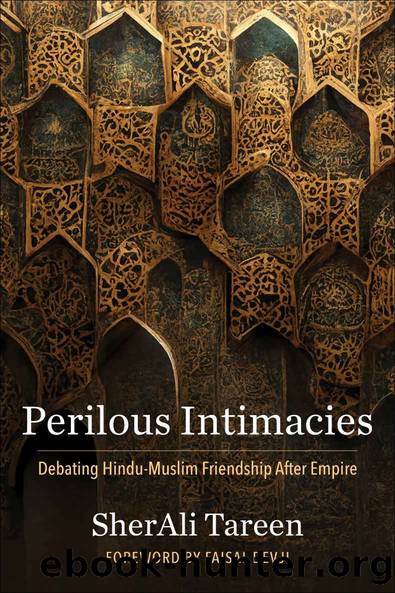Perilous Intimacies (Religion, Culture, and Public Life) by SherAli Tareen

Author:SherAli Tareen [Tareen, SherAli]
Language: eng
Format: epub
ISBN: 9780231210317
Publisher: Columbia University Press
Published: 2023-09-18T22:00:00+00:00
Negotiating Colonial Power
Khanâs articulation and presumption of an imperial Muslim political theology did not mean that he was oblivious to or that he ignored the reality of British colonial power, however. Exactly to the contrary, he was not only keenly aware of British presence but also closely attuned to the opportunities and benefits afforded by that presence. For instance, while arguing for the preservation of Muslim markers of distinction, Khan frequently invoked the colonial promise of tolerance toward individual religious communities and of its commitment to ensuring the freedom of religion. Pressuring Indian Muslims to abstain from cow sacrifice, he often proclaimed, ârepresented an abomination that the [colonial] authorities should never allow.â22
There are two aspects of Khanâs engagement with the colonial state and law that I wish to especially highlight. First, among his central strategic moves was to establish concordance between the objectives of colonial law and the operative logics of Islamic jurisprudence. Remember, Khan had argued that even though cow sacrifice was not in essence a religious obligation in Islamic law, Muslims were not allowed to be coerced into abandoning this practice. This was because succumbing to such coercion would bring shame and humiliation to the Muslim community, an outcome that cannot be tolerated in Islamic law. Now Khan connected this premodern logic of Islamic jurisprudence to the modern colonial discourse on coercion. He claimed that the British should never allow the fracturing of a religious communityâs honor and freedom by tolerating its subjection to coercive subjugation. In effect, Khan stitched disparate yet intersecting threads in colonial and Islamic law to weave an overlapping discursive project.
Second, in trying to demonstrate that precluding Muslims from the ritual of cow sacrifice constituted a breach of religious freedom, he first had to prove that this ritual was indeed wholly and legitimately âreligious.â This he sought to do most often by citing numerous Qurâanic verses and the Prophetâs sayings that establish cow sacrifice as among the distinguishing markers of Islam. The most prominent such verse (22:36) reads: âAnd as for the sacrifice of cattle, we have ordained it for you as among the symbols [of distinction] designated by Godâ (wa-l budna jaâalna-ha lakum min shaâair Allah).23 Similarly, in a prophetic report cited in all six canonical books of Hadith in Sunni Islam, the Prophetâs youngest wife and prolific Hadith narrator, âAâishah bint Abi Bakr (d. 678), reported that âthe Prophet had sacrificed a cow on behalf of his wives.â Also, the Prophetâs close companion Jabir bin âAbd Allah (d. 697) narrated that the Prophet had âcommanded his Companions to sacrifice a cow or camel, one on behalf of seven people.â24 Khanâs objective in mobilizing such discursive fragments from the tradition was to prove, as he put it, that âcow sacrifice is a religious ritual for Muslims normatively sanctioned by the Qurâan [and Prophetâs normative model or Sunnah].â25
Having established the religious character of cow sacrifice, Khan proceed to remind colonial authorities of their duty to honor the principle of religious freedom (mazhabi azadi) in an evenhanded manner that does not privilege the sensibilities of one group over those of another.
Download
This site does not store any files on its server. We only index and link to content provided by other sites. Please contact the content providers to delete copyright contents if any and email us, we'll remove relevant links or contents immediately.
| Central Asia | Southeast Asia |
| China | Hong Kong |
| India | Japan |
| Korea | Pakistan |
| Philippines | Russia |
The Rape of Nanking by Iris Chang(3525)
The Sympathizer by Viet Thanh Nguyen(3509)
World without end by Ken Follett(3010)
Ants Among Elephants by Sujatha Gidla(2928)
Blood and Sand by Alex Von Tunzelmann(2611)
Japanese Design by Patricia J. Graham(2561)
City of Djinns: a year in Delhi by William Dalrymple(2139)
Inglorious Empire by Shashi Tharoor(2103)
In Order to Live: A North Korean Girl's Journey to Freedom by Yeonmi Park(2062)
Foreign Devils on the Silk Road: The Search for the Lost Treasures of Central Asia by Peter Hopkirk(2058)
Tokyo by Rob Goss(2022)
India's biggest cover-up by Dhar Anuj(1989)
India's Ancient Past by R.S. Sharma(1988)
The Great Game: On Secret Service in High Asia by Peter Hopkirk(1962)
Tokyo Geek's Guide: Manga, Anime, Gaming, Cosplay, Toys, Idols & More - The Ultimate Guide to Japan's Otaku Culture by Simone Gianni(1949)
Goodbye Madame Butterfly(1938)
The Queen of Nothing by Holly Black(1760)
Living Silence in Burma by Christina Fink(1733)
Batik by Rudolf Smend(1723)
